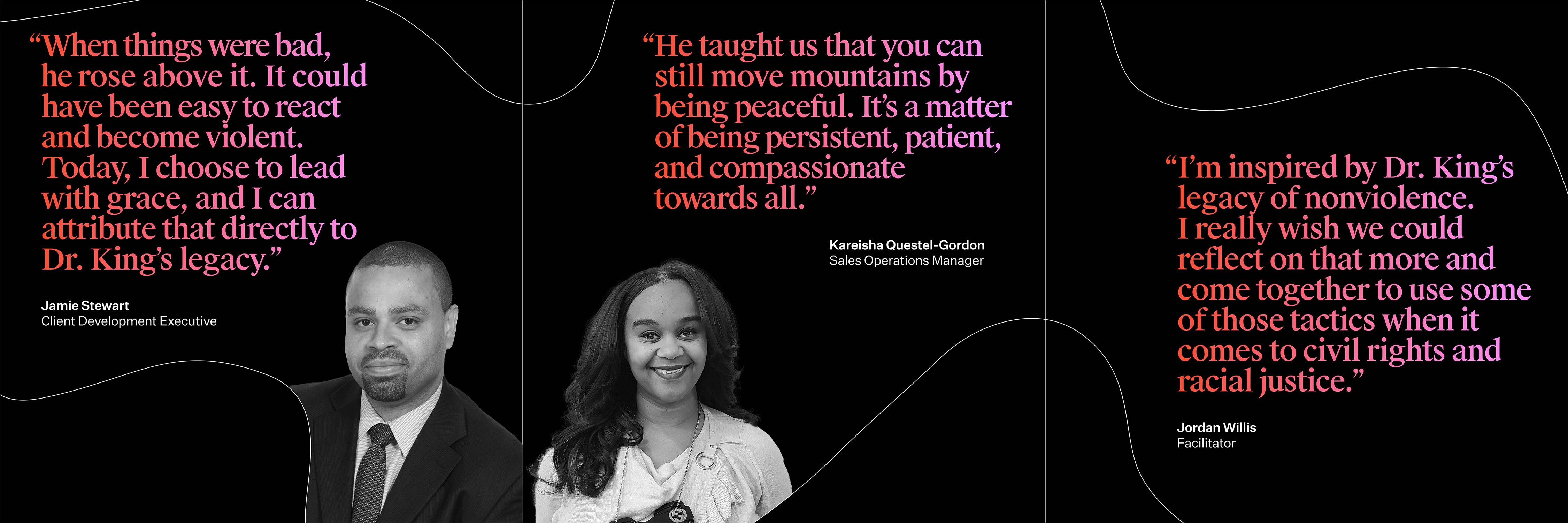Our Impact
As we reflect on Dr. Martin Luther King Jr.’s legacy, we sat down for a conversation with our three co-leads of the Black Equity Team at MillerKnoll. Together, these individuals represent three different geographies across North America and lead nearly 150 members of the Black Equity Team.
Meet the co-leads and read a little more about what Dr. Martin Luther King Jr.’s legacy means to them:
- Jamie Stewart, Client Development Executive in Toronto, Canada
- Kareisha Questel-Gordon, Sales Operations Manager in New York Tri-State and Philadelphia
- Jordan Willis, Facilitator in Spring Lake, Michigan

What does Dr. Martin Luther King Jr.’s legacy mean to you?
Jamie: I am in Canada so there is a geographic barrier. Since Dr. King was an American icon, it seems Canada often does not acknowledge his history. I can’t say this was intentional, but we were not taught about Dr. King in school, so it felt like there was a line of demarcation. I learned about the legacy Dr. King through my American family.
I've educated myself about him and I know he's a man of tremendous grace. I think about the James Baldwin quote: “To be a Negro in this country and to be relatively conscious is to be in a state of rage almost, almost all of the time — and in one's work.”
I do feel that, but I choose grace. When things were bad, he rose above it. It could have been easy to react and become violent. Today, I choose to lead with grace, and I can attribute that directly to Dr. King's legacy.
Kareisha: Dr. Martin Luther King Jr.’s efforts have allowed me to be free and comfortable. He taught us that you can still move mountains by being peaceful. It’s a matter of being persistent, patient, and compassionate towards all.
Jordan: I feel kind of both ways. Sometimes I feel like there's great movement forward from the things he did, but I also feel like there's a lot of work to be done still. And sometimes it almost seems like there's been some backsliding, so that can be disappointing.
But one of the biggest things I appreciate about the nonviolent movement is that we're in a day and age where more people have access to platforms to let their voices be heard. You don't have to be a militant-minded person or risk as much to take a stand on an issue.
I’m inspired by Dr. King’s legacy of nonviolence. I really wish we could reflect on that more and come together to use some of those tactics when it comes to civil rights and racial justice.
How do you choose to live out his legacy today?
Jamie: Dr. King talked a lot about measuring people based on the content of their character, not the color of their skin. I chose sales as a profession because I’m measured by my percentage to plan not what I look like or what someone says about me. So, I don't know if that correlates directly to Dr. King, but I think the way I approach my life is very much based on judging myself based on my overall worth, not the way I look.
Kareisha: It can be a surprise to see a social media post in your feed that strays from your core values, especially when it is posted by a friend or family member. Rather than blast off in the comments, or block and ignore the person, I choose to live out Dr. Martin Luther King Jr.’s dream by never losing hope in humanity’s ability to learn from one another. Guided by acts of compassion, I feel empowered to stand up against blatant injustices.
Jordan: Dr. King had a lot of courage and I respect that. I reflect on the courage of people like Dr. Martin Luther King Jr. and other people who took the lead to drive such a large-scale change and try to use that in my day-to-day life.
As a person of color, it takes courage to take a stand or step into a leadership role when not everyone looks like you. It takes courage to lead the way and say, “OK, let's go to work and keep moving forward.”
What is your hope or dream for the next generation?
Jamie: My hope is that Dr. King can be used as kind of a middle ground. It feels like we are very much on the extremes right now. The left and the right or Black and white - however you want to parse it out.
People are very nuanced - we can feel one way about one issue and feel very differently about another issue. We are not prescribed to one side or the other. I think there's a level of individuality that makes us unique, diverse, and multifaceted. So, my hope would be that we would look more toward Dr. King as a bridge-builder for conscious dialogue and common ground.
Kareisha: We do have a long way to go, as Jordan said earlier. When we look at how smart some of the kids are now, they've learned in two years what we may have learned in 10. It's amazing to see them grow and empower each other to learn and adapt while experiencing major change. It’s important to continue to share our history with kids so that they can pass along their legacy and make their own decisions to become better human beings.
Jordan: If you’re passionate about something, you can make an impact peacefully. If the next generation — or really all generations — understood that, there’s potential to come together to make powerful moves as a collective.
On this National Day of Service, our Black Equity Team encourages our associates and partners to visit a street or monument closest to you that is named after Dr. King and reflect on what his legacy means to you.